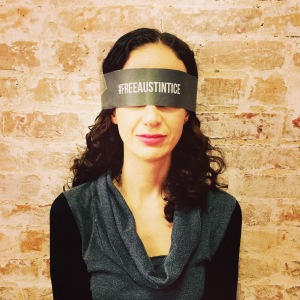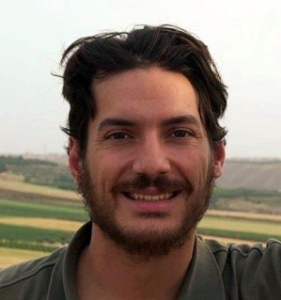
“Without journalists we’re all blindfolded.” That’s the rallying cry of the #FreeAustinTice campaign.
If you haven’t heard about the campaign yet, here’s the scenario: Austin Tice, a freelance journalist, disappeared in Syria in 2012. In addition to being an award-winning reporter whose work has appeared in The Washington Post and McClatchy Newspapers, he’s a former Marine and Georgetown law student. Some believe he’s being held by the Bashar al-Assad regime, but it’s not known for sure.
A month ago his parents teamed up with Reporters Without Borders, a press freedom organization, to launch a campaign to raise awareness of his plight and to encourage Americans to take action. They’re asking people to:
1) Take the blindfold pledge – e.g. wear the blindfold, a symbol of their son’s kidnapping – and spread the symbolic image on social media.
2) Sign the petition urging our government to step up its efforts to get Tice home.
3) Donate to Reporters Without Borders to support their work.
Ads directing readers to FreeAustinTice.rsf.org are running on 260+ news sites and there’s been a good deal of media coverage of the situation.

I was moved by the campaign (I can’t imagine being in Tice’s parents’ shoes) and I feel that press freedom is a critical issue, so I’ve been engaging in conversations about the situation with colleagues, friends and family, reading the related news stories and scanning the response to those stories.
One thing I’ve learned – that I didn’t fully appreciate previously – is that some people feel that journalists who go into risky areas are being selfish because they’re ultimately putting others at risk.
I wholeheartedly believe that conflict journalists need to have proper training – like the kind provided by Sebastian Junger’s Reporters Instructed in Saving Colleagues (RISC). They should take all the precautions they can and they should have the tools to self-rescue to the extent possible, but I have to say that I feel that people who make this argument and blame these journalists for doing their (very difficult) job fail to understand the role of the press in preserving democracy.
We need this information. We need to understand what’s happening in these war-torn countries to make informed decisions and to ultimately maintain a free society. What’s the alternative? Stay deaf, dumb and blind? Ignore genocides, corruption, etc. and assume it will go away and that won’t happen here? In Tice’s mother’s words, “So many Americans didn’t know about these missing journalists — even James Foley, whose situation was so public — until they came to this brutal end. Americans need to know the sacrifices journalists make, the risks they take to bring us the real news, the news about things that are going on in other parts of the world.”
It’s probably safe to say that given Tice’s service as a Marine, he was neither naïve nor underprepared for the dangers he faced.
Meanwhile, to be clear, Tice’s parents say they do not favor a rescue attempt to get their son out of Syria. His father, Marc, is quoted in the Washington Post saying, “We’re not looking at putting American soldiers in harm’s way to try to save Austin. We believe in diplomacy, dialogue, in communication between the two countries.”
The criticism about journalists taking unnecessary (read: selfish) risks is new to me, but it wasn’t new to Tice. On his Facebook page in July 2012, in response to critics he posted: “I don’t have a death wish — I have a life wish. So I’m living, in a place, at a time and with a people where life means more than anywhere I’ve ever been — because every single day people here lay down their own for the sake of others.” Read his full thoughts here.
What do you think?
